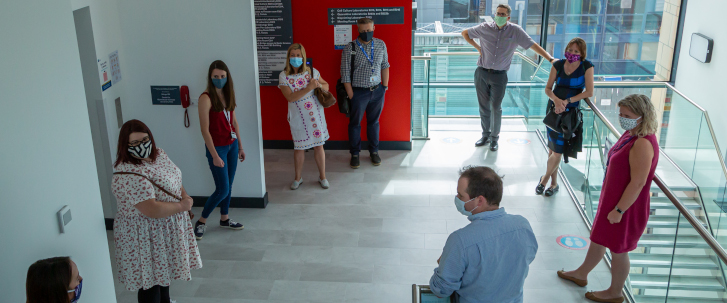
As with many people in the country, I have spent the last four months in my neighbourhood, speaking to everyone other than my husband and a few people in the supermarket through the medium of an iPad, laptop or phone. This week, I spent two days back on campus, visiting the Vet School at Sutton Bonington, as well as the Biodiscovery Institute, the School of Chemistry and Cavendish Hall on University Park. Initial trepidation about leaving the safety of my home gave way very quickly to pleasure in meeting staff and students in person and recognising what a tremendous amount of detailed work, thought and imagination has gone into ensuring our campuses are safe places to return.
Research was a major focus of my visit on both campuses. Researchers have been understandably frustrated at the impact on their work caused by lockdown, and keen to return to campus to restart it. However, everyone I met recognised the significant efforts to reopen their facilities safely made by colleagues in Estates, Health and Safety and local technicians, such as Martin Dellar in Chemistry, who knows the building from years of working in it and helped map out the requirements for returning staff to their labs. The joy of being back in a familiar environment is accompanied by a commitment to wearing face coverings and observing social distancing measures, and in all the buildings, staff are becoming accustomed to one-way systems that sometimes require them to go outside a building and back in again if they need to access the room next door to their lab.
Both staff and research students talked about what they have learned about lab culture having been away from it and how they maintained motivation when cut off from crucial facilities. PhD students Jamie Thompson and Alice Cardall, and Derby Medical Technician, Rebecca Tarbox, discussed how their inability to progress with their individual projects led them to pool common skills during lockdown. They worked with Andrew Benest and other colleagues to produce a jointly authored paper on a different approach to testing Covid patients using heat inactivation, rather than chemicals or kits.
In the School of Chemistry, I heard how early career scientists used the lockdown period to keep in touch virtually with collaborators across the globe and deployed the extra time to do some self-directed learning of key skills. I met postdoc Katie Reynolds, whose recent blog about her experiences of returning to work offers real inspiration to others. The requirements of social distancing have led to the need for rota systems, which limit the number of people in the lab at any one time, but staff in Chemistry suggested this provided a welcome challenge to an unnecessarily presentist culture, while ensuring greater collaboration and stricter and more efficient work plans.
I also heard about research that had continued in the Vet School during the lockdown period, when a number of researchers continued working on Covid-related subjects, including the development of antivirals, presented to me by Kin-Chow Chang on behalf of his group. However, the bulk of my visit to the School was spent learning how colleagues were managing the return of the new April cohort of 150 students who are now on campus for the first time, living in the halls of residence and undertaking practical classes face-to-face. Staff in the School have developed an impressive and detailed plan for supporting these students, who are living and studying in ‘household groups’. The commitment of all staff to a focus on student wellbeing and quality of experience has led to more frequent personal tutor communication, as well as lockdown innovations such as cooking tutorials to keep everyone’s spirits up.
Kate Cobb, Sub-Dean for Teaching, Learning and Assessment in the School, provided us with the proper kit so that we could observe a practical class where students were studying animal lymph systems. There I spoke to a household group who expressed relief at finally being in the classroom and able to socialise with peers. The Vet School staff and students are offering themselves as a pilot for regular testing, including using the methods that Andy Benest’s group (see above) developed during lockdown.
Finally, I paid a visit to Cavendish Hall, which has been open throughout lockdown for students who - for a variety of reasons - were unable to return home, as well as NHS workers. Jackie Ashley and Sally King, Hall Managers, showed me around and told me about the measures taken to adapt the dining room and other public spaces, as well as how suspected cases were isolated during the early days of the lockdown. I appreciated being able to talk to James Matai, an international student on the Engineering Foundation Course, who spent lockdown in his room completing his studies, watching Netflix, playing his guitar and staying in touch with friends via social media. He told me that after the initial anxiety of the first few days, he felt safe and well looked after in the Hall, but that he was looking forward to beginning his Aerospace degree in September.
Everyone I met was glad to be on campus, although many colleagues admitted the understandable initial anxiety they felt on their first day back. Certainly, the social distancing measures we must adopt and the wearing of face coverings indoors will require some getting used to, and I could see that many people are still adjusting to these necessary restrictions. However, my overall observation is that human beings thrive on contact with other human beings. If we need to do this behind masks, or behind screens or at a distance in order to mitigate the risks of infection, then these sacrifices are worth it to allow us to interact again and begin to restore the spirit and liveliness of our university community.

Professor Shearer West
Vice-Chancellor
5 August 2020